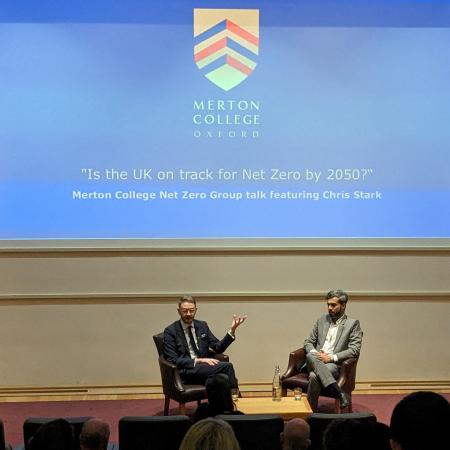Is the UK on track for Net Zero by 2050? Merton College Net Zero Group meeting
‘Is the UK on track for Net Zero by 2050?’ This was the weighty question posed to Chris Stark, Chief Executive of the UK Climate Change Committee (CCC), in a discussion hosted by Merton College Net Zero Group (MCNZ) in the T S Eliot theatre and livestreamed on the evening of 6 February. The talk was chaired by MCNZ committee members Matt Vickers (1990) and Nagadarsan Suresh (2021), the latter of whom joined in discussion with Chris Stark.
Chris Stark began by explaining that the UK is unusual in having a legal commitment to reducing greenhouse gas emissions to Net Zero by a given date. The legislation stems from the 2008 Climate Change Pact and the subsequent Climate Change Bill and binds whichever government is in power. The Climate Change Committee (CCC) exists to advise the government on its five yearly interim targets (‘carbon budgets’): assessing progress and advising on pathways to meet the targets.
The first job of the CCC was to improve on the goal of 60% reduction in greenhouse gas emissions to 80% and, finally, to 100%: Net Zero.
Chris’s message seemed to be that in terms of energy production, yes: the UK has been pioneering ways to decarbonise the economy, namely in energy production, and is ahead of most other G7 and G20 countries. Advances in renewable energy technology and implementation, particularly in offshore wind farms, are set to dominate the UK power industry and policy-driven change has brought down the price of clean energy for the consumer. Economically, renewable energy makes good sense: while there is considerable initial outlay, it pays dividends in the long term. This is something the UK can lead on, demonstrating to other countries how it makes economic sense to invest in renewable energy sources.
Chris talked about the other areas involved in achieving Net Zero that are more challenging: the transport system, manufacturing, agriculture and carbon capture in agricultural land, and the heating of buildings. He explained that each of these areas has complex factors that determine the pace of change. Taking transport as an example, although we might want to stop selling petrol-fuelled cars from tomorrow, the supply chain and infrastructure needs to be in place for this to be implemented.
Decarbonising land use is especially complex – but while presenting considerable challenges, there are opportunities for net gain if we manage to move forward. Government policy is needed, and we need financial incentives to make it work.
Chris explained that little has been done to address the UK adapting to climate change, namely because until recently, talk of ‘adaptation’ was seen as conceding defeat. However, now that there is acknowledgement of what climate change is going to bring - e.g. 40-degree summer days, flooding, changes in agriculture – it is recognised that strategies are needed in order to anticipate the changes before they happen.
When asked which was best – de-growth (cutting down on consumption) or green growth, Chris Stark was very much on the side of green growth, stating that we need to aim for the abundance of energy that green energy can yield. It’s a political stance too, he explained: Western developed economies “have grown their economies by plundering the world’s resources”, and economies that are developing now need to continue to make progress. Achieving Net Zero involves creating conditions in which fossil fuels are not the future, and where renewables actually benefit the economy, and the UK can demonstrate how this works.
At the end of the talk, Chris Stark said ‘Net Zero’ was originally presented as a radical change – but that this is unhelpful. One of the key takeaways from this talk was that Net Zero does not actually demand a huge disruption to how we live. With continued political commitment and gradual adaptations, the UK can even benefit economically in the long-term from reaching Net Zero and set an example for other countries to follow.
The above summary is just some of the content of the talk: naturally, the discussion gave rise to many questions from the floor and from online attendees. Some were answered in the time available, and some remain… perhaps for the next time MCNZ meet.
Founded by committee members Matt Vickers (1990), Ria Miller (2008), and Nagadarsan Suresh (2021), Merton College Net Zero group is open to all Mertonians. The group aims to connect alumni, students, staff and Fellows for discussions on decarbonisation and climate change from diverse perspectives.
If you would like to join the group, please email development@merton.ox.ac.uk.
